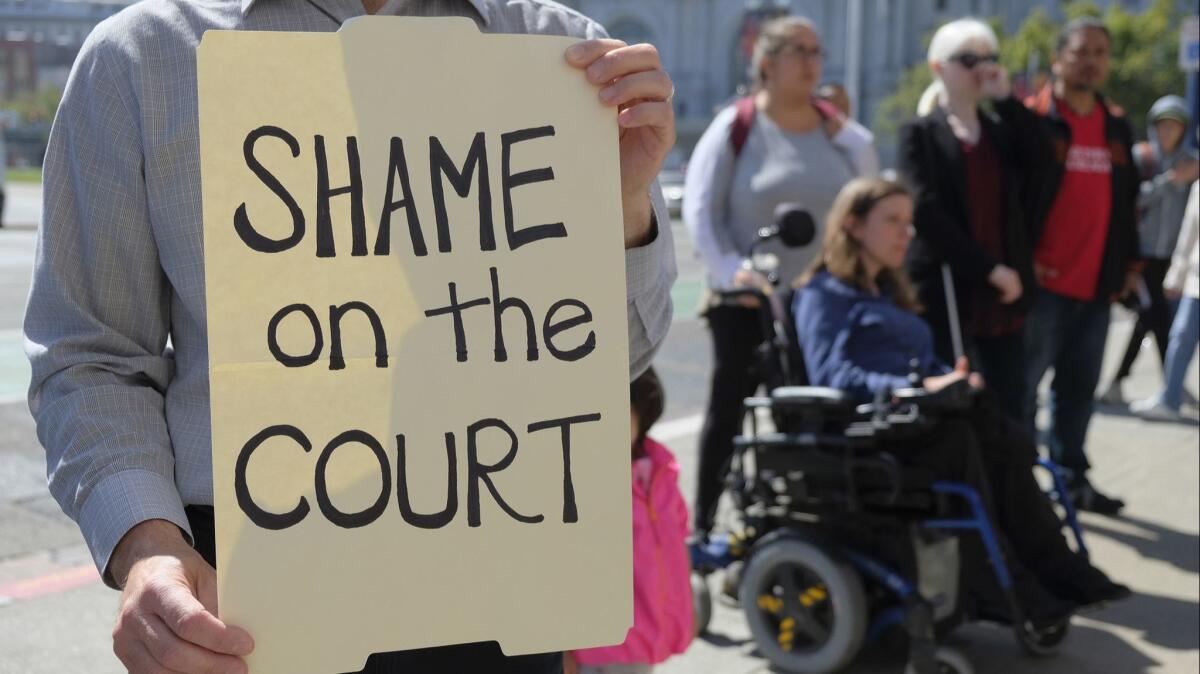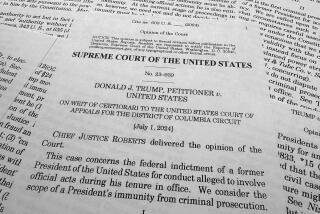Op-Ed: The Supreme Court’s travel ban decision wasn’t just misguided, it was hypocritical

I have rarely seen so much inconsistency and even hypocrisy from the Supreme Court as in its decision to uphold President Trump’s travel ban.
A few weeks ago, the court found that members of the Colorado Civil Rights Commission had expressed impermissible hostility to religion because of relatively mild statements that every business in Colorado should serve all customers regardless of the owner’s religion, and that terrible things have been done in world history in the name of religion. By contrast, the court in upholding the travel ban essentially ignored repeated statements from Trump and his top advisors that he wanted to ban Muslims from coming to the United States.
The president initially promulgated the travel ban by executive order on Jan. 27, 2017. It suspended immigration from seven countries for a period of 90 days and suspended the refugee program for a period of 120 days. It had an exception for those who were from minority religions in these countries. The seven countries shared three things in common: All were more than 90% Muslim, Trump had no economic investments in any of them, and none ever had been linked to terrorist activity in the United States.
The Supreme Court ignored that fundamental American principle and created a precedent that gives the president vast powers to discriminate.
After a federal court of appeals invalidated the travel ban, Trump issued a new executive order: It suspended immigration from six countries (Iraq was taken off the list) for 90 days and the refugee program for 120 days. It did not have an exception for those of minority religions in these countries. After two federal courts of appeals declared this order unconstitutional, the Supreme Court granted review. But the time periods expired before the court could hear the case, and the matter was dismissed as moot.
The president then issued a third version of the travel ban by executive proclamation. This suspended immigration from eight countries: North Korea, Venezuela and Chad were added to the list, likely to make it seem that it was not a Muslim ban. The U.S. 9th Circuit Court of Appeals struck this down as violating a 1965 federal law that prohibits discrimination in issuing visas based on race, religion, sex, national origin or country of residence. The U.S. 4th Circuit Court of Appeals also invalidated the travel ban, in its view because it was impermissibly discriminatory on the basis of religion.
The Supreme Court, 5-4 — divided exactly along ideological lines — reversed these courts. Chief Justice John G. Roberts Jr. wrote the majority decision. The court said that the 1965 law prohibiting discrimination in issuing visas was not controlling because of an earlier federal law that allows the president to suspend entry of “immigrants or non-immigrants.” It is strange that an earlier law is seen as superseding a later one, especially when the purpose of the 1965 statute was to end immigration quotas by country, which had tragically kept many fleeing the Holocaust from entering the United States.
Enter the Fray: First takes on the news of the minute from L.A. Times Opinion »
Of even greater significance is the court’s contention that great judicial deference must be paid to the president in immigration policies, and that his actions will be upheld so long as they are supported by a conceivable legitimate purpose. With this premise, the court made irrelevant all the statements Trump and his advisors made about their desire for, as candidate Trump put it, a “total and complete shutdown of Muslims entering the United States.” The government’s claim that there is a national security justification for the ban is all that mattered. The dissenting justices in the travel ban case rightly analogize the majority’s ruling to the Supreme Court’s infamous decision in Korematsu vs. United States, which upheld the internment of Japanese Americans during World War II. Both policies were based on prejudice, not national security. In 1944, there was no evidence linking Japanese Americans to any threat to the country; there is now no evidence linking immigrants or visitors from the designated travel ban countries to terrorism. Although Roberts’ majority opinion repudiated Korematsu, the court ignored its crucial lesson.
Korematsu and now Trump vs. Hawaii represent the false assumption that danger to the nation can be determined by a person’s nationality or country of residence. In the United States, dangerousness should never be determined by race, ethnicity, national origin or country of residence. The Supreme Court ignored that fundamental American principle and created a precedent that gives the president vast powers to discriminate. It may be a victory for President Trump, but it is a huge loss for the Constitution and the rule of law.
Erwin Chemerinsky is dean and Jesse H. Choper Distinguished Professor of Law at the UC Berkeley School of Law.
Follow the Opinion section on Twitter @latimesopinionand Facebook
More to Read
A cure for the common opinion
Get thought-provoking perspectives with our weekly newsletter.
You may occasionally receive promotional content from the Los Angeles Times.










